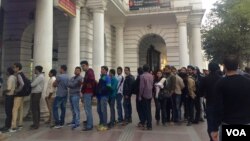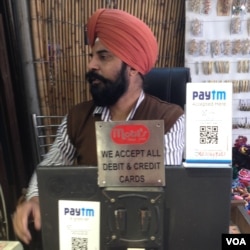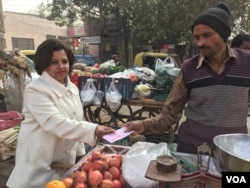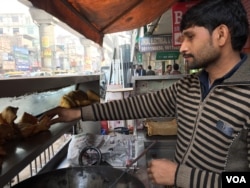Hundreds of customers who come to pick up popular local savories at Satnam Singh’s shop in a bustling market in New Delhi used to hand out cash for their purchases, usually amounting to $2 to $5. But his sales plunged after massive currency shortages hit India following last month’s ban on high value denomination notes.
Realizing that people did not have cash to spare for non-essential purchases, he began offering his customers the option to pay via mobile wallets. “Standing in long lines at banks is a problem, so I am helping customers,” said Singh.
Satnam Singh’s shop has become part of the “cashless” economy the government has been pushing since its controversial ban on 500 and 1,000 rupee notes ($7.50 and $15, respectively) last month.
The government hopes the measure will flush out vast hoards of illegal cash, bring more money into the banking system and check tax evasion in a country where huge volumes of business and trade are transacted in cash, often escaping the taxman’s net.
Since announcing the ban, Prime Minister Narendra Modi has repeatedly urged the country to embrace online payment channels.
“Download banking apps on your smart phones, keep credit card machines, learn cashless transactions,” Modi told small traders and daily wage earners in a recent radio address. “Like businesses in big malls, this user-friendly technology can help you expand business.”
The government hopes the massive spread of mobile phones in recent years will drive an electronic payments boom in the country. But financial experts warn it is an uphill task.
So far, debit and credit cards are restricted to the urban middle class. And while some like Satnam Singh have been quick to make the transition, driving a sharp rise in online and electronic transactions, millions of small traders and roadside vendors are clueless about about how to make the switch, raising a huge question mark over the government’s ambitious agenda to digitize the economy.
Fruit vendor Salan turns away many customers who offer a 2,000 rupee ($30) note because he has no change to give them - small denomination notes have been in short supply since the ban. But he is completely lost concerning online payment channels.
Can he learn? The man who subsists from day to day on his meager earnings and has never seen a computer or a credit card shrugs in despair.
“I have no idea how to operate these,” he said.
The reliance on cash is highest in the informal sector, which makes up only 20 percent of the economy, but accounts for 80 percent of the country’s employment.
This army of workers, whether they are laborers, housemaids, drivers or small traders and vendors, are often illiterate and only familiar with handling cash.
The challenge is especially large in rural areas where many do not have bank accounts, where internet connections are often patchy and where most people have never made an online transaction. Although a start has been made, a massive mindset change is needed before the economy can become “cashless,” said Saloni Nangia, President at retail consultancy Technopak Advisors.
“When money is concerned it is natural that there would a fear in the consumers mind before they adopt new means.” Calling this the fear of the unknown, Nangia points out that “a number of people might not be really able to grasp the fact that there is no scare of losing their money.”
Prime Minister Modi is aware of the challenge. Saying an entire generation in the country is not familiar with the idea of online payments, he has appealed to tech-savvy young people to “take out some time daily, half an hour, one hour, to teach 10 families this technology.”
But technology is not the only obstacle.
While the government is eyeing a more transparent economy and hopes to collect more taxes through online transactions, many bigger shops point out that most people prefer to pay in cash to avoid paying the service tax of around 12.5 percent. Often working on thin margins, working with cash helps shop owners also avoid the gaze of the taxman.
But hoping to overcome the hesitation about embracing online transactions, digital payment companies have gone into an advertising blitz in a bid to cash in on the opportunity.
India’s largest mobile payment company, Paytm, says it has doubled the number of merchants it has enrolled in the last four weeks. Hoping to enroll millions more in the next few months, it has launched huge advertising campaigns.
And in a country where cash has ruled the roost, the currency shortages have made the idea of digital transactions take root.
Manoj Kumar, owner of a shop selling Indian sweets and snacks, has been idling for weeks as cash-starved consumers bypass shops which do not accept credit cards. Now he has contacted a mobile payment company. “The dip in business has been phenomenal. I am sure this will boost my business.” said Kumar.







